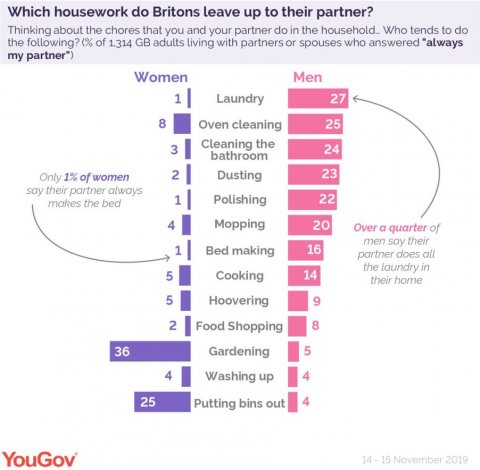
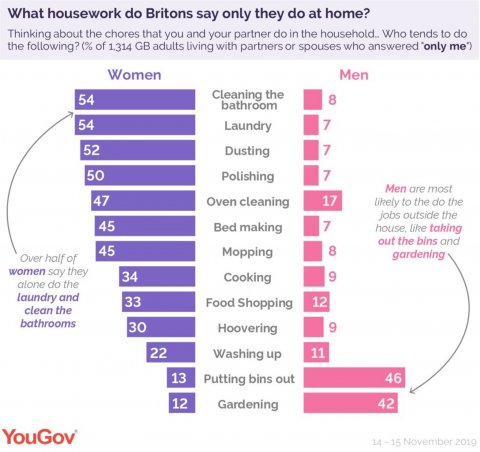
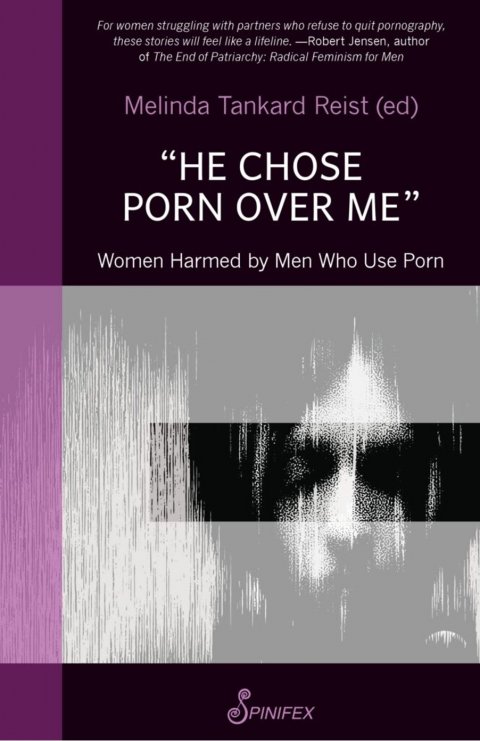
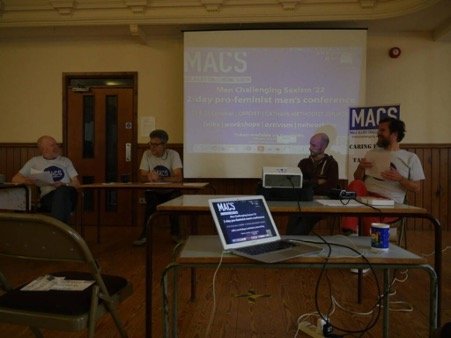
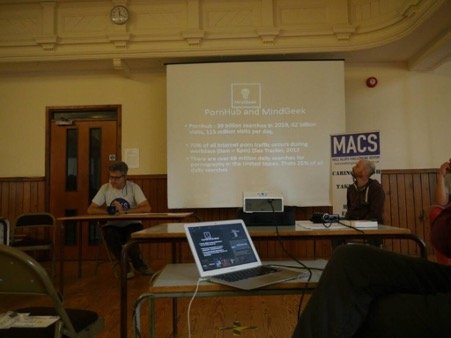
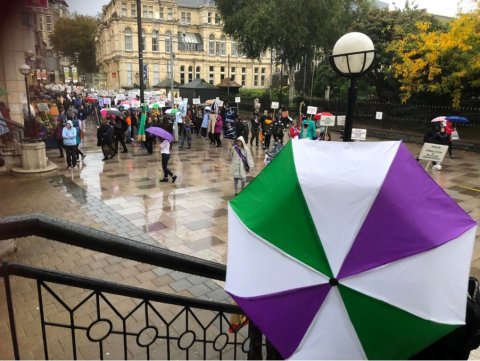

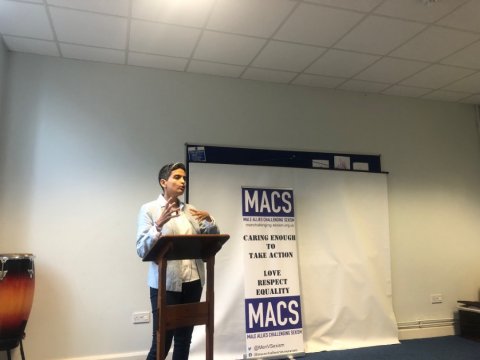
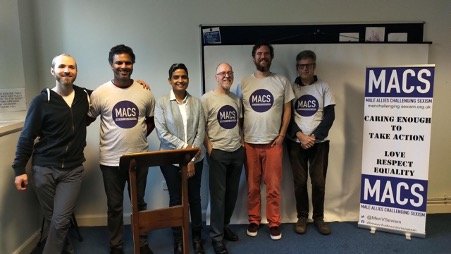
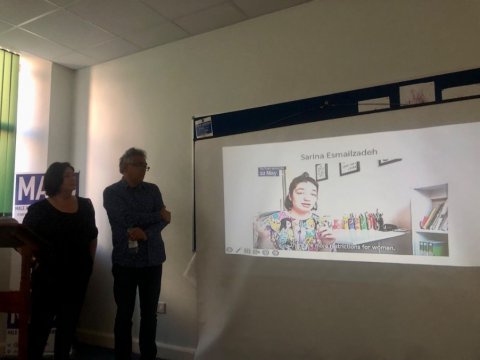

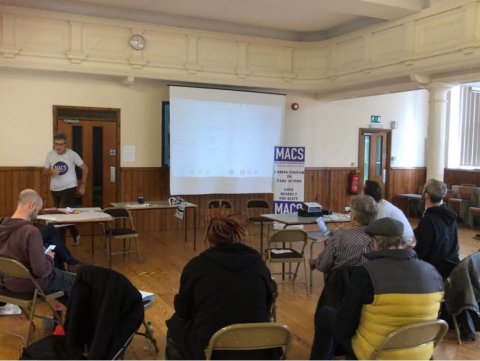
It’s a couple of days since the #MenChallengingSexism conference in Cardiff and we’re so pleased with the level of engagement by the men who attended over the weekend, as well as the support and encouragement of feminist organisations, individual women and our amazing guest speakers Maryam Namazie and Vaishnavi Sundar.
On Saturday, Chris Green (MACS co-founder) held his workshop about housework, titled ‘How much housework do you do, matey?’. We learnt that in 2020, ‘women overwhelmingly say they do more than their fair share’ (YouGov, 2020), which is illustrated perfectly by the below two graphs from the same source.
Chris spoke to us about a number of steps we can all actively take to change this inequality in the home. These include:
- Doing the Great Chore Audit and self-monitoring our performance (remember: don’t get defensive).
- Sharing the emotional work. For instance, pay attention to things that need to be done regularly, like dust build-up and surfaces that need polishing, and do them when you see they need doing. Suggest things to do together instead of asking your partner ‘What shall we do tomorrow?’ expecting her to come up with a brilliant idea.
- Supporting your partner’s work and career. Change your own plans – plan work and housework times for both of you.
- Being a role model to others by modelling equally shared housework/tasks around other people, especially young people. If you have kids, show them how to negotiate and share housework and tasks. Encourage them to do their share.
- Sharing your behaviour and what you have learned. Tell male friends about the disparity in the amounts of housework done by men and women and the efforts you are making, and introduce them to the chore audit. Talking about it reinforces your own practice and hopefully encourages other men to follow suit.
The second session of the day was a roundtable / panel discussion chaired by David Brooks (MACS volunteer and Book Group Lead). The discussion focused on the experience of Moriah, one of 25 brave women who shared their personal stories of their porn-consuming male partners with Melinda Tankard Reist for her new book He Chose Porn over Me: Women Harmed by Men Who Use Porn. We spoke about various issues and themes that Moira’s story brought up.
Chris spoke about the porn industry and its reach. Estimates about how much money the porn industry generates vary, but range from less than US$6 billion a year to US$10 billion, US$15 billion or even US$97 billion a year. Even at the lower end of the estimate, this means that in 2021, porn makes more money than Twitter, whose revenue that year was US$5 billion. Chris also educated us about the issue that Virtual Reality porn will pose. A recent study estimated that VR porn will increase significantly, from being worth US$716 million in 2021 to US$19 billion in 2026, representing 22% of the global digital pornography market value by 2026.
More specifically to the current situation, Chris pointed out that in 2019 there were 42 billion visits to Pornhub, equalling 115 million visits a day. In total, 39 billion searches were entered, often bringing up one of the 6.83 million new video uploads in 2019.
This is problematic because of the disturbing nature of (even mainstream) porn. As one writer said about Pornhub, the ‘site is infested with rape videos. It monetises child rapes, revenge pornography, spy cam videos of women showering, racist and misogynist content, and footage of women being asphyxiated in plastic bags. A search for “girls under18” or “14yo” leads in each case to more than 100,000 videos’.
Chris provided some shocking statistics about the violence in porn, quoting recent research finding that 40% of pornography contained physical aggression, 97% of which was directed at women, who responded mainly positively or neutrally and rarely negatively to the men’s aggression.
MACS volunteer Ben next spoke about porn addiction and how porn hijacks the reward pathway in the brain, changing sex from an essential drive for humans to survive to something that dominates men’s lives and becomes something that men think about and engage with more and more.
Ben also spoke about how dopamine in our bodies surges when we are presented with something new, which means that to keep the dopamine surges, men seek out more and more novel sexual interactions and porn to get the same dopamine surge. Ben pointed out that in today’s world, people can have more novel experiences in just a few minutes than our ancestors could in a lifetime – much more than our brain can handle. So the bad news is that all this dopamine causes craving for more pornography and creates physical brain changes. Men’s pleasure response will become number and they will become hyper-reactive to pornography as everything else becomes boring. Additionally, there is willpower erosion (this is the same for all addictions) triggered by DeltaFosB, a molecular switch. These changes have been evidenced in brain scans, but there is some good news: all changes are reversible.
Pornography also kills sexual performance, and there is now widespread youth erectile disfunction like never before. Men who started out on high-speed internet porn typically need months longer to recover their sexual health than men of 40 years old. Loss of grey matter in the reward circuitry (desensitisation) appears to play a role in porn-induced erectile dysfunction, but the fact that young men often need longer to recover points to deep sexual conditioning during adolescence.
To end the panel, MACS co-founder Björn spoke about male entitlement. He said that individually male entitlement appeared to focus on getting what we want, and being willing to get it no matter the consequences to others, and the willingness to use threats or violence if we are ‘denied’ what we want. Björn made links between male entitlement and the earlier talk on housework, pointing out that there is an assumption for a lot of men that housework (or certain aspects of it) are ‘women’s work’.
The subject of male entitlement broadened the scope beyond pornography and an expectation of women’s consent to any sexual activity, to aspects such as men expecting to be listened to and taken seriously by women, and expecting women’s care, affection, compassion and admiration (sexist stereotypes), as informed by Kate Manne’s work. Björn referenced ‘himpathy’, a phrase coined by Manne, which highlights a societal form of male entitlement, namely the ‘inappropriate sympathy given to men or boys, especially those who are guilty of sexual transgressions’.
Björn also brought up issues such as public space that men take up, including manspreading, whistling and shouting in public. He finished his contribution by reading a quote from mass murderer Elliot Rodgers, whose chilling YouTube video prior to his attack showed how far male entitlement reaches. In the video, which Rodgers made before he murdered six people, he said: ‘You girls have never been attracted to me. I don’t know why you girls aren’t attracted to me but I will punish you all for it. It’s an injustice, a crime because I don’t know what you don’t see in me, I’m the perfect guy and yet you throw yourselves at all these obnoxious men instead of me, the supreme gentleman. I will punish all of you for it’.
During the remainder of the day, we elaborated the issues around pornography, such as the impact it has on men, and especially young men and boys and their expectations.
In the evening, we supported and stood in solidarity with FiLiA, whose rally protested male sexual violence against women and girls. The rally was organised by WRN Wales and Merched Cymru, using the hashtags #NeverHerFault and #BythArEiBai.
On Sunday morning, we were fortunate to listen to activist and filmmaker Vaishnavi Sundar who spoke to us about the situation women are facing in India. She covered a range of issues, including femicide (in particular of female babies), the impact of male violence and misogyny contributing to India having the highest female suicide rate in the world, institutional misogyny, legal rape in marriage, women being murdered as witches, as well as the impact of gender identity ideology on Indian women. Her poignant question ‘How do you define male violence against women, if man and woman are fluid?’ will stay with us for a long time!
The second talk of the day was given by Maryam Namazie and Fariborz Pooja, and focused on Iran’s Women’s Revolution, which started after Iran’s morality police brutally murdered Mahsa (Zhina) Amini in September 2022 for not being properly veiled.
Maryam shared some powerful images and videos captured under the regime’s brutal reign before and during the current revolution. Images showed women being pushed, dragged and pulled into police cars whilst being arrested, as well as some of the protests in Iran after Amini’s murder.
Mrayam pointed out that the average age of protesters being arrested is 15, and named protesters Nika Shakarami and Sarina Esmailzadeh (both 16 years old) who were murdered by police during the protests.
Maryam and Fariborz underlined that this was a turning point in history, with young, media-savvy Iranian girls using their online presence to push for change and freedom, and that men were also supporting the protests. They also mentioned the relevance of the protestors using the slogan ‘Women, life, freedom’, which was initially used by the Kurdish independence movement, since Amini was Kurdish. Fariborz added that the slogan is reminiscent of the French revolutionary slogan ‘Liberté, égalité, fraternité’.
They highlighted the importance of pressuring the UK government to cut diplomatic ties with Iran and keep supporting the Iranian Revolution, and of maintaining pressure on the Iranian regime through solidarity action, such as demonstrations, petitions and writing to MPs.
In the afternoon, we had a roundtable discussion about what had brought us to pro-feminism, and also strategised about ways forward for MACS. We were particularly keen to discuss what we could do to address the impact and cost of pornography to women and prevent the violence against women that is connected to pornography.
The icing on the cake of the weekend was being approached by a man in a local pub who saw us wearing our t-shirts saying ‘Respect, equality, safe spaces for women’ and who wanted to express his support for what we stood for. It was truly humbling! Chris said he’s been doing this work for 20 years and nothing like this has happened before – there is hope!
Reposted with permission from Male Allies Changing Sexism. First printed here, October 27 2022.